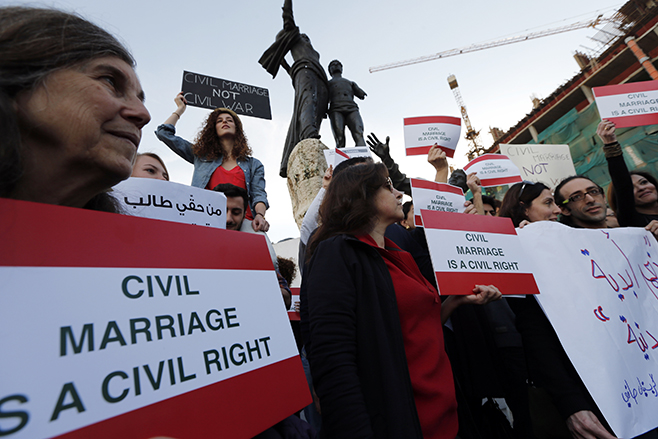Source: Human Rights Watch
Download Full Report HERE: HRW Report-Lebanon
(Beirut) – Lebanon’s religion-based personal status laws discriminate against women across the religious spectrum and don’t guarantee their basic rights, Human Rights Watch said in a report released today. Lebanon has 15 separate personal status laws for its recognized religions but no civil code covering issues such as divorce, property rights, or care of children. These laws are administered by autonomous religious courts with little or no government oversight, and often issue rulings that violate women’s human rights.
The 114-page report, “Unequal and Unprotected: Women’s Rights Under Lebanon’s Religious Personal Status Laws,” found that, across all religions, personal status laws erect greater barriers for women than men who wish to terminate unhappy or abusive marriages, initiate divorce proceedings, ensure their rights concerning their children after divorce, or secure pecuniary rights from a former spouse. The laws also violate children’s rights, most significantly the need to consider their best interests in all judicial decisions concerning their welfare.
“Not only are Lebanese citizens of various religions treated unequally under the law, but women are treated unfairly across the board, and their rights and security go unprotected,” said Nadim Houry, deputy Middle East and North Africa director. “Passage of an optional civil marriage code, alongside badly needed reforms to existing personal status laws and religious courts, are long overdue.”
Human Rights Watch analyzed 447 recent legal judgments by religious courts adjudicating divorce, custody, and spousal and child support, and interviewed lawyers, judges, social workers, activists, and women who went through divorces or custody battles in religious courts.
Lebanon’s constitution explicitly guarantees respect for the “personal status and religious interests” of the individual, whatever their religion. This constitutional protection has often been used as a justification to keep personal status laws under the exclusive realm of religious authorities, block attempts to adopt a civil code or ensure greater oversight over Lebanon’s religious courts and laws.
The 1936 decree that established the basic personal status order and that remains operational recognized freedom of belief, granting each person the right to opt out of their religion’s personal status laws and marry under a civil code. But Lebanon has yet to adopt a civil code despite numerous campaigns since independence to do so.
The 1936 decree required each religious group to submit its personal status code and trial procedures to the government and the parliament for review and ratification to ensure compliance with the constitution and public order. But while the Christian and Jewish confessions submitted their laws for review, the Sunni confession objected to the requirement, and a later decree was issued stating that the provisions of Decree 60LR did not apply to Muslims. In the vast majority of cases, the Court of Cassation, the country’s highest court for all civil cases, will not consider the substantive decisions of the personal status courts.


